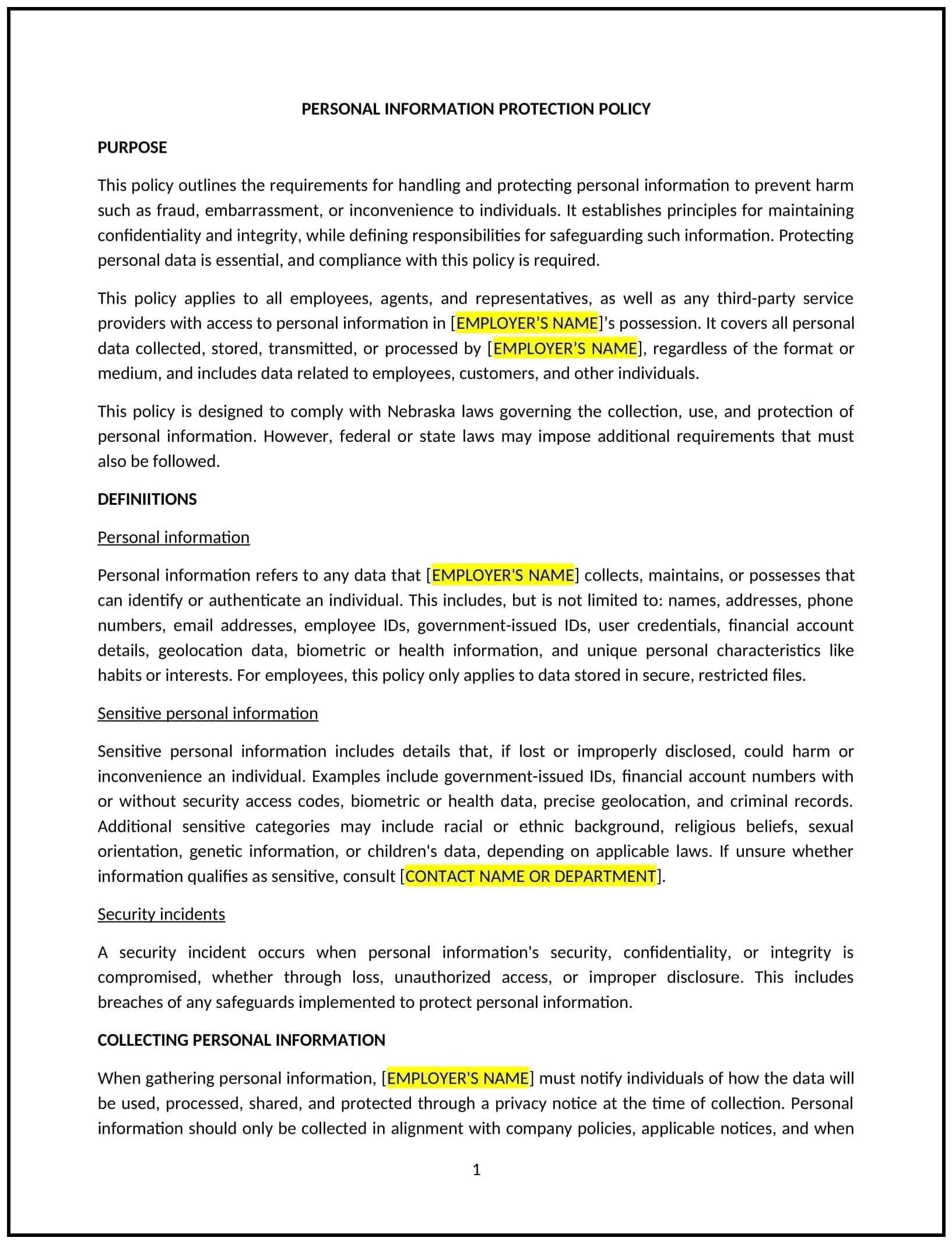Personal information protection policy (Nebraska): Free template
Got contracts to review? While you're here for policies, let Cobrief make contract review effortless—start your free review now.

Customize this template for free
Personal information protection policy (Nebraska)
A personal information protection policy helps Nebraska businesses safeguard sensitive employee, customer, and company data from unauthorized access, misuse, or breaches. This policy outlines the company’s approach to handling personal information, including collection, storage, access, and disposal. It is designed to promote responsible data management, protect privacy, and mitigate risks associated with data breaches or unauthorized disclosures.
By adopting this policy, businesses in Nebraska can maintain trust with employees and customers, reduce the risk of data exposure, and establish clear guidelines for handling personal information securely.
How to use this personal information protection policy (Nebraska)
- Define personal information: Clearly specify what constitutes personal information, such as names, addresses, phone numbers, Social Security numbers, financial details, medical records, and any other sensitive data the company collects or processes.
- Outline data collection procedures: Specify how personal information should be collected, including obtaining consent where necessary and limiting data collection to only what is needed for legitimate business purposes.
- Establish access controls: Implement strict access controls to ensure that only authorized personnel can access personal information. Outline role-based access permissions and require multi-factor authentication where applicable.
- Secure data storage: Define security measures for storing personal information, including encryption, secure servers, password protection, and physical security protocols for paper records.
- Address data sharing and transfers: Specify how and when personal information may be shared with third parties, including service providers or business partners. Require that third parties follow data protection standards before sharing any information.
- Implement data retention and disposal guidelines: Establish rules for how long personal information is retained and how it is securely disposed of when no longer needed. Include procedures for deleting or securely shredding records.
- Provide employee training: Educate employees on data security best practices, phishing risks, and how to handle sensitive information to minimize accidental data breaches.
- Respond to data breaches: Develop a clear incident response plan outlining the steps to take if a data breach occurs, including notification procedures, mitigation efforts, and any required reporting to affected parties.
- Review and update: Regularly review and update the policy to ensure it remains effective and aligned with Nebraska state laws and industry best practices.
Benefits of using this personal information protection policy (Nebraska)
This policy provides several benefits for Nebraska businesses:
- Protects sensitive data: Clearly defining data protection measures helps reduce the risk of unauthorized access, breaches, or identity theft.
- Builds trust with employees and customers: A transparent approach to handling personal information demonstrates a commitment to data privacy, strengthening relationships with employees, customers, and business partners.
- Reduces legal and financial risks: Establishing proper data protection practices helps businesses minimize the risk of regulatory violations, fines, and reputational damage due to mishandling personal data.
- Enhances cybersecurity: Implementing security protocols for data handling reduces exposure to cyber threats, phishing attacks, and data breaches.
- Promotes accountability: A structured approach to managing personal information ensures employees understand their responsibilities and follow best practices for data security.
Tips for using this personal information protection policy (Nebraska)
- Communicate the policy clearly: Ensure that all employees understand the importance of protecting personal information and are aware of the procedures for handling data securely.
- Implement access restrictions: Limit employee access to sensitive personal information based on job roles. Ensure that only authorized personnel can view or process confidential data.
- Monitor for security risks: Regularly assess company systems for vulnerabilities, unauthorized access attempts, or other cybersecurity threats that could compromise personal information.
- Provide ongoing employee training: Conduct regular training on data security best practices, including how to recognize phishing attempts and handle sensitive data responsibly.
- Use secure communication channels: When transmitting personal information electronically, use encrypted emails, VPNs, and secure file-sharing systems to prevent unauthorized interception.
- Regularly review and update security measures: Stay informed about evolving data security risks and update company procedures to maintain strong data protection standards.